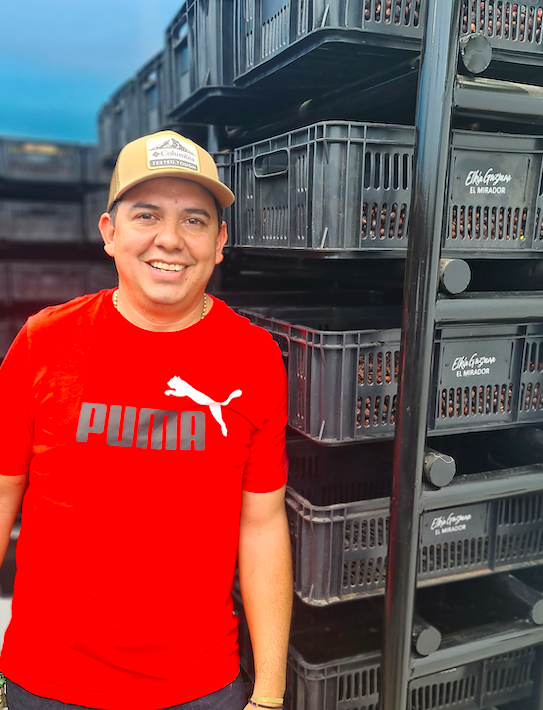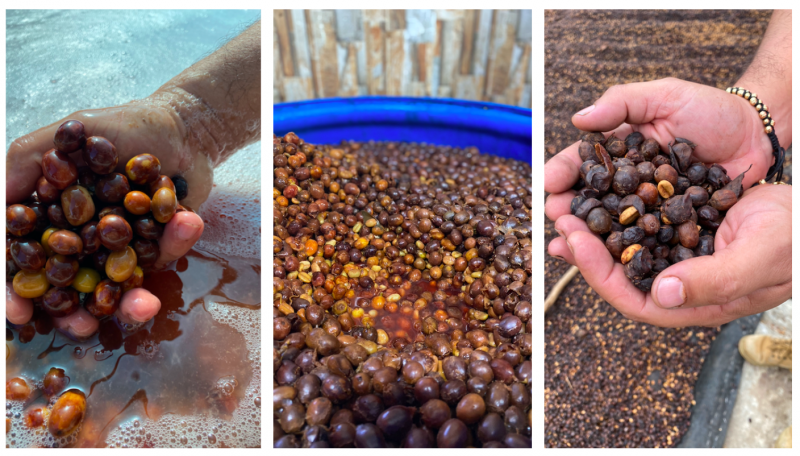Words and interviews by Nicole and José Fernández
Colombia, with its diverse landscapes and varied climates, boasts a terroir that gives birth to coffees with rich flavours and unique characteristics. Nestled between mountain ranges and bordered by two oceans, Colombian coffee regions provide an ideal environment for cultivating not only the well-known mild arabica beans but also exotic varietals, some of them developed by local scientists, some of them imported from Africa, Brazil and even from the Caribbean. Colombian specialty coffee has become synonymous with excellence, making its way to the podiums at Championships year after year, captivating baristas and roasters worldwide and contributing to the South American country's esteemed reputation in innovation in processes and other novel fermentation techniques.
Our role in the industry is as importers with Sabores Flavours of Colombia. Commitment to consistently offer exceptional green beans involves building direct relationships with the farmers. The philosophy of "relationship coffee" means negotiating directly with farmers and understanding the value of their product by spending quality time with them and their teams and families where the coffees are grown, processed and packed. On a visit to Colombia earlier this year, we strengthened these connections during walks among exotic varietal crops, wet mills, and fermentation stations. This constant and close communication with the producers, allowed us to explore relevant aspects of their point of view and four key questions were posed, echoing inquiries that we often get from roasters and coffee lovers. Hearing the perspectives and insights of four different producers is an enlightening experience. So many similarities, so many differences. Each has a unique story to tell, just like the coffees they produce. This is true for coffee producers all over the world and we need to sit up and take notice.

Elkin made a name for himself globally, particularly with the El Mirador farm in Pitalito, known in international barista and brewer’s competitions. Elkin pioneered carbonic maceration fermentation techniques in coffee, and he’s also been the developer of processes such as natural hydrohoney and koji fermented coffee, continuously creating new and surprising processing methods.
1. What are the primary challenges faced by specialty coffee producers in Colombia?
There are plenty of challenges, but I believe the main two are the lack of knowledge and information around coffee processing, and secondly the climate issue.
Regarding the first: Only in the last few years has the topic of special processes in coffee (naturals, honeys, co-fermentations) gained attention. Producers have learned they can improve their coffee quality by adopting these novel and trending methods. However, the lack of accurate information readily available to the coffee grower on these subjects leads to extremely costly errors. Many have tried to switch to these new processing methods, failing to recreate consistent results. Those of us who have been able to gather the relevant data and establish a clear, replicable procedure for each type of process and exotic varietal have been able to succeed and remain active in the international markets, because the cup profiles and quality do not suffer major variances.
We won’t get anywhere as a coffee growing community if the only way to develop a great (and profitable) coffee is through incurring high expenses. Building a certain type of wet mill, spending large amounts of money on a processing station, these measures make the coffee more expensive, limiting the number of farmers who could produce such coffees and who could financially afford the initial investment to get better returns for themselves and their families.
On the climate challenge: Global warming is affecting us quite a lot, as it interferes with the flowering stage. Our trees get fewer flowers due to prolonged rainy periods and increasingly long dry, hot seasons. These fluctuations also end up affecting the entire physiology of the plant, and each coffee grower needs to actively learn the behaviour of the different varietals on his own farm so that the right measures can be set in place to maintain a decent yield and to keep improving the quality of the cherries to be collected. This is a must for each of us: we must deeply understand how our own plants behave for us to adapt to foreign markets and to keep our product attractive to them.
2. What changes have you made in recent years to stay current in coffee production and maintain crop exports?
To keep ourselves up to date, we keep close communication with our clients, because at the end of the day, we work for a specific market and for some specific clients. We must produce coffees that are trendy and that the market requests from us. It can get very tricky for us. For example, a couple of years ago, there was a big interest in “funky” fermentations, usually done over extended periods. There was a point when those clients had had enough of those “funky” coffees, which was about a year ago. Now that the clients ask for more “conventional,” smooth, and clean profiles of coffee, we had to go back to protocols we had used at an earlier stage. When we start experimenting with new processes, that trial and error phase until we get it right can take from about four months to a year, and not only do we invest a lot of time but also a lot of funds at that stage. That can be quite hard for us farmers, as we need to quickly adapt to the client’s necessities. This 2023 has been an adaptation year for me because clients want washed coffees that taste like naturals and naturally processed coffees that taste like washed ones. If we do not adapt and change, then the market will change us.

3. Where do you see Colombian specialty coffee production heading in the medium-term future?
Specialty coffee farming in Colombia will keep on growing. From all these years of experience, it’s hard to witness how some producers haven’t understood that things at their farms should always be done correctly, no matter how the market price fluctuates.
Here’s the contradiction: when the international coffee price is high, quality is lost. They don’t pay full attention to manual harvesting methods or to completing the drying phase adequately, selling wet coffee as quickly as possible to try and make money fast while the good buying prices last. And when the international trading prices are low, then we get a knock on our door from those producers interested in learning how to increase their cup quality to sell it at a prime rate. This vicious cycle shows how some coffee growers are irresponsible with their farm management, putting at risk the financial sustainability of their family company - because that’s what a farm is, a family - and disappointing international customers who will then decide not to buy from their farm again. We need to try and work together to ensure that the quality of Colombian coffee is maintained, to try and keep the prime rate that buyers pay for Colombian coffees compared to other origins. This should not be a difficult task; we have a unique environmental offer throughout the national territory, and there are exotic varieties which are fully adapted to their local terroirs. We also have adapted to a great commercial dynamic with the rest of the world, and customers often visit the farms. By allowing farmers to have this opportunity to present their farms and their processing stations, specialty coffee from Colombia keeps being showcased on social media and in international competitions. We keep seeing several Colombian coffees in the finals over the past few years. We see nowadays even the Colombian Coffee Growers Federation (the governing national board) and Cenicafé (their lab and main nursery) talking about naturals and honeys, while when we started as pioneers with those methods in Colombia, we were kind of the outlaws among the farmers. It’s sad that it’s taken so long for such important institutions to realize the importance of innovation in coffee processing as well as in accepting varieties of coffees previously seen only in Africa or in the Caribbean Antilles as great representatives of our coffee growing options. I am very grateful we did not listen to those voices who asked us to stick only to traditional methods and varieties and that we decided to venture into the world of exotic varietals and other methods different from fully washed. The future of coffee depends on the farmers dare and follow their instincts: coffee talks to us and we need to listen to it.
4. If given the opportunity, what aspects of the global trade and marketing of Colombian specialty coffees would you alter?
Life goes by in cycles, and parallel to them, there’s also constant evolution. The international dynamics in specialty coffee marketing have worked for me: specialty coffee shops mention us, the farmer, our identity, they give us credit. The same way as an importer gets our samples with the name of the producer, the variety, the processing methods, and other information, is very useful and often displayed when marketing the end-roasted product. That final product, with our name on it, with full traceability fills us up with pride. I really wouldn’t change anything with the way real specialty coffee is marketed; it allows that roasted coffee to keep its identity. It’s of the utmost importance for green coffee buyers, either roasters or traders, to live the full experience at our farms and to talk directly to us, for them to understand where the financial value of the coffee they are looking to bring to their home countries comes from. It’s quite hard when a coffee you’ve worked hard for with your team is poorly judged on the cupping table and we get asked to considerably reduce the price of it. That’s my invitation to coffee traders: come and live the experience by our side so you can get a grasp of the real added value.